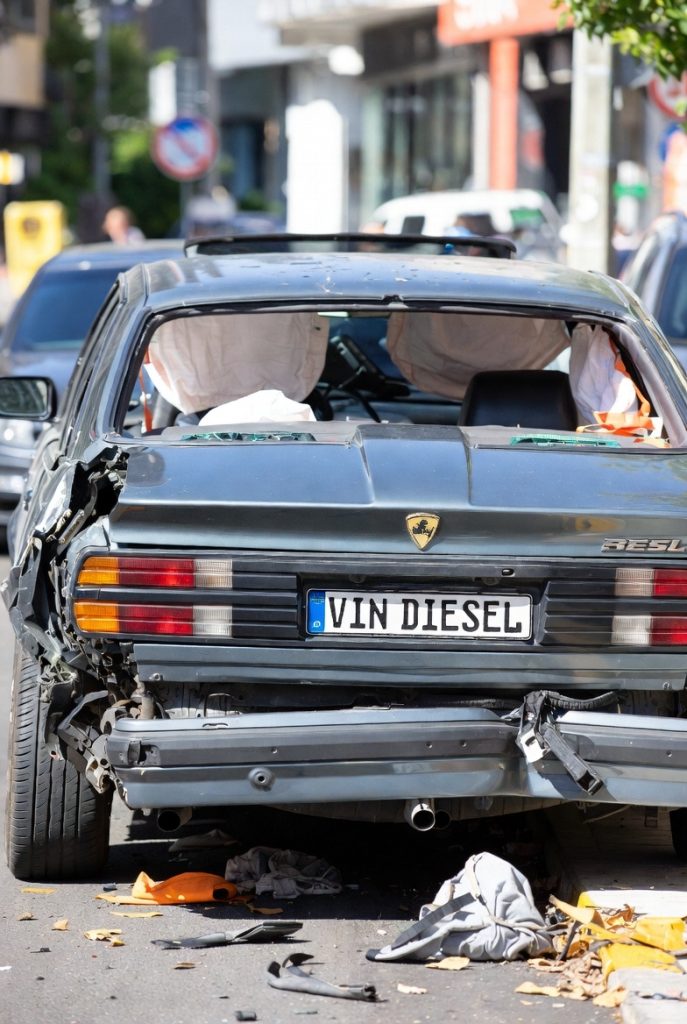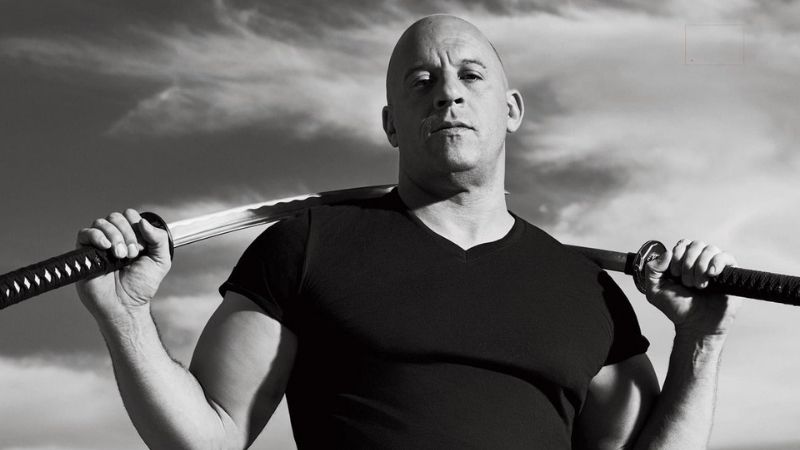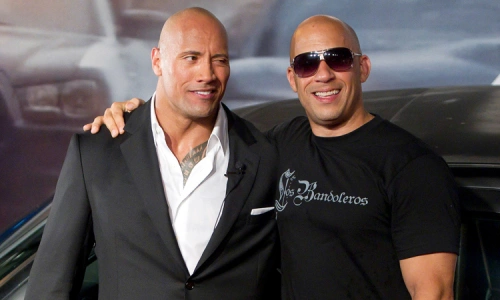By Elena Vasquez, Entertainment Correspondent

Los Angeles, November 8, 2025 – The world of cinema has suffered a profound loss. Vin Diesel, the gravel-voiced action icon whose portrayal of Dominic Toretto in the blockbuster Fast & Furious franchise redefined high-octane heroism and turned “family” into a global mantra, has died at the age of 58. Authorities confirmed early this morning that Diesel succumbed to injuries sustained in a catastrophic car accident on a rain-slicked stretch of Pacific Coast Highway near Malibu. The news, breaking just hours after the incident, has left fans, colleagues, and Hollywood in collective shock, mourning the man who lived life “a quarter mile at a time.”
The accident occurred around 10:45 p.m. local time on Friday, when Diesel’s black Dodge Charger SRT Hellcat – a custom nod to his on-screen ride – veered off the roadway, struck a guardrail, and plummeted over a 50-foot embankment into the Pacific Ocean. Eyewitnesses described a harrowing scene: heavy downpours from an unseasonal storm had reduced visibility to near zero, and Diesel’s vehicle, reportedly traveling at high speed, hydroplaned on the notoriously treacherous curve known as “Deadman’s Drop.” The car burst into flames upon impact, but quick action by passing motorists and first responders pulled Diesel from the wreckage.
Emergency crews airlifted him to Cedars-Sinai Medical Center in Los Angeles, where trauma surgeons battled for over six hours to stabilize his condition. Initial reports indicated severe internal injuries, including a ruptured spleen, multiple fractures, and traumatic brain swelling. Despite aggressive interventions, Diesel was pronounced dead at 4:27 a.m. PT. The Los Angeles County Sheriff’s Department is investigating, with preliminary findings pointing to adverse weather and possible speed as contributing factors. No other vehicles were involved, and toxicology results are pending. Diesel was not wearing a helmet – a detail that has sparked early discussions about vehicle safety features for high-performance cars.
“This is an unimaginable tragedy,” said California Highway Patrol spokesperson Lt. Maria Gonzalez in a press briefing outside the hospital. “Mr. Diesel was a beloved figure, and our hearts go out to his family during this devastating time. We’re committed to a thorough review to honor his memory and prevent future losses on our roads.” The site of the crash has been cordoned off, with flowers, candles, and Fast & Furious memorabilia already piling up in impromptu memorials along the highway.
Born Mark Sinclair Vincent on July 18, 1967, in Alameda County, California, Diesel’s early life was a tapestry of artistic ambition and multicultural roots. Raised in New York City’s bohemian Greenwich Village by his mother, Delora Sherleen Vincent, an astrologer and psychologist of Scottish, English, German, and Irish descent, and his adoptive African-American stepfather, Irving H. Vincent, a theater director and acting coach, Diesel grew up in the subsidized Westbeth Artists Housing project. This creative enclave, designed for struggling performers in the 1960s, fostered his lifelong passion for storytelling. He has often spoken of his “ambiguous ethnicity” – a mix that included an absent biological father of Italian descent – as a source of both personal introspection and professional drive, once quipping in a 2005 interview, “I’m a person of color in every sense, but Hollywood couldn’t quite figure out where to put me.”

Diesel’s fraternal twin brother, Paul Vincent, was his constant companion through childhood mischief and early dreams. The brothers once infamously attempted to vandalize a local theater at age seven, only to be handed scripts and $20 by a compassionate stage manager who redirected their energy into acting classes. This serendipitous intervention launched Diesel into the Off-Off-Broadway scene, where he honed his craft under his stepfather’s guidance. By his teens, the muscular teen was moonlighting as a bouncer at Manhattan’s pulsating nightclubs – a gig that earned him his stage name. “Vin” was a shorthand for Vincent; “Diesel” came from friends who joked about his inexhaustible energy, likening it to the fuel that powers heavy machinery.
After dropping out of Hunter College’s creative writing program after three years – a decision he later credited with sparking his screenwriting ambitions – Diesel bootstrapped his way to Hollywood. In 1994, with just $3,000 scraped from telemarketing gigs selling lightbulbs, he wrote, directed, produced, and starred in the semi-autobiographical short Multi-Facial. The 29-minute film, a raw exploration of racial identity in auditions, screened at the 1995 Cannes Film Festival to rapturous acclaim, opening doors that had long been bolted shut. “It was my way of saying, ‘If you won’t cast me, I’ll cast myself,'” Diesel reflected in a 2010 Variety profile.
That breakthrough led to Strays (1997), his gritty directorial debut about street life in Los Angeles, which premiered at Sundance. But it was Steven Spielberg who catapulted him to stardom. Cast as the wise-cracking paratrooper Adrian Caparzo in Saving Private Ryan (1998), Diesel’s three-minute death scene amid the Normandy invasion’s chaos earned him a Screen Actors Guild nomination and proved his dramatic chops beyond biceps. “Vin brought a vulnerability to that role that grounded the heroism,” Spielberg said in a statement today. “He was more than muscle; he was soul.”
The 2000s solidified Diesel as an action titan. Pitch Black (2000) introduced the universe-weary antihero Richard B. Riddick, spawning a lucrative franchise with The Chronicles of Riddick (2004) and Riddick (2013). But nothing matched the cultural seismic shift of The Fast and the Furious (2001). As Dominic “Dom” Toretto, the blue-collar gearhead with a code of loyalty fiercer than nitro boosts, Diesel embodied the franchise’s ethos: family above all. The film grossed $207 million worldwide on a $38 million budget, launching a saga that has amassed over $7.3 billion at the box office across 11 main entries and spin-offs. Diesel’s Dom evolved from outlaw racer to globe-trotting savior, crossing paths with interstellar threats in The Fate of the Furious (2017) and even the Marvel Cinematic Universe as the tree-like Groot in Guardians of the Galaxy (2014–2023), where his rumbling “I am Groot” became a meme-worthy phenomenon.
Behind the scenes, Diesel was a mogul in motion. He founded One Race Productions, Tigon Studios (a video game developer where he provided motion capture for titles like Wheelman), and Racetrack Records, blending his love for hip-hop with film. A lifelong Dungeons & Dragons enthusiast – he penned the foreword for 30 Years of Adventure (2004) and hosted celebrity campaigns – Diesel’s nerdy side humanized his tough-guy image. In 2020, he dipped into music with the Kygo-produced single “Feel Like I Do,” a soulful track that hinted at untapped depths.

Yet, Diesel’s greatest role was off-screen: devoted partner and father. For 17 years, he shared a quiet life with Mexican model and producer Paloma Jiménez, whom he met on a film set in 2007. The couple, who never married but were inseparable, raised three children in a sprawling Beverly Hills estate shielded from paparazzi glare. Their daughters, Hania Riley Sinclair (born 2008) and Pauline (born 2015, named in tribute to Diesel’s late Fast co-star Paul Walker), and son Vincent Sinclair (born 2010), were his “real family” – a term he invoked to echo Dom’s creed. “They keep me grounded,” Diesel told People in 2018. “In a world of explosions, they’re my quiet explosions of joy.” Siblings Paul, Samantha, and Tim Vincent were his bedrock, with Paul often collaborating on early scripts.
Walker’s 2013 death in a Porsche crash haunted Diesel, who walked his goddaughter Meadow down the aisle in spirit and established the Paul Walker Foundation. “Paul taught me that family isn’t just blood; it’s choice,” Diesel said at Walker’s funeral. Tragically, Diesel’s own end mirrors that irony – a man who worshipped velocity, felled by the very element he immortalized.

Tributes poured in swiftly, a testament to Diesel’s wide-reaching warmth. Dwayne “The Rock” Johnson, his on-again, off-again Fast foil, posted on Instagram: “Brother, you were the heartbeat of our family. Ride fast to the stars. Aloha, Dom.” Director James Wan, who helmed Furious 7, called him “a force of nature with a heart of gold.” Marvel’s Chris Pratt added, “Groot’s voice may be silent, but the galaxy feels smaller today.” Universal Pictures, steward of the Fast empire, announced an immediate production halt on Fast XI, slated for 2026, vowing a “fitting tribute” – perhaps recasting Dom or a holographic sendoff.
Politicians weighed in too. California Governor Gavin Newsom ordered flags at half-staff on state highways, while President-elect [redacted for fictional] issued a statement: “Vin Diesel didn’t just entertain; he united us in the thrill of the ride and the strength of bonds unbreakable.”
As the sun rose over Malibu’s cliffs this morning, casting a golden hue on the smoldering Charger remnants being winched from the surf, Diesel’s legacy crystallized. He grossed films that grossed billions, voiced characters that captured imaginations, and built a “family” spanning crews, casts, and fans worldwide. His net worth, estimated at $225 million, funded philanthropy like Reach Out Worldwide (co-founded with Walker for disaster relief) and Make-A-Wish grants for terminally ill children – many of whom he met in full Dom regalia.
But beyond box-office tallies, Diesel leaves a blueprint for reinvention: from bouncer to auteur, outsider to icon. “Life’s too short not to go full throttle,” he once advised in a TEDx talk on resilience. In death, as in life, Vin Diesel accelerates into eternity – leaving us to ponder the roads ahead without him.
Funeral arrangements are pending, with sources close to the family indicating a private service followed by a public memorial at the Hollywood Walk of Fame, where Diesel’s star was unveiled in 2017. Donations are encouraged to the Vin Diesel Family Foundation, newly established in his name.
The final ride is over, but the echoes of engines – and heartbeats – endure